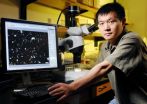(Press-News.org) Lost your keys? Your brain might be in a better state to recall where you put them at some times than at others, according to new research from UC Davis. A paper describing the work is published June 13 in the journal Proceedings of the National Academy of Sciences.
"It's been assumed that the process of retrieving a memory is cued by an external stimulus," said Charan Ranganath, professor at the UC Davis Center for Neuroscience and Department of Psychology. "But we found that the levels of brain activity before items came up were correlated with memory."
Graduate students Richard Addante and Andrew Watrous; Ranganath; Andrew Yonelinas, professor of psychology at the UC Davis Center for Mind and Brain; and Arne Ekstrom, assistant professor of psychology at the Center for Neuroscience, measured a particular frequency of brainwaves called theta oscillations in the brains of volunteers during a memory test.
Theta waves are associated with a brain that is actively monitoring something, Ranganath said. For example, rats show high theta waves while exploring a maze.
In the memory test, the volunteers had to memorize a series of words with a related context. They later had to recall whether they had seen the word previously and the context in which the word was seen.
High theta waves immediately before being prompted to remember an item were associated with better performance.
The work goes against the assumption that the brain is waiting to react to the external world, Ranganath said. In fact, most of the brain is busy with internal activity that is not related to the outside world – and when external stimuli come in, they interact with these spontaneous patterns of activity.
It's not clear whether it is possible to deliberately put your brain into a better state for memory recall, Ranganath said. The laboratory is currently investigating that area – with the hope that it might lead to better treatments for memory loss.
###
The work was funded by grants from the NIH.
Brain state affects memory recall
2011-06-14
ELSE PRESS RELEASES FROM THIS DATE:
Scripps Research team sheds new light on how blood clots form
2011-06-14
Scripps Research Institute scientists have discovered new elements of the blood clot-formation process. The findings could lead to better drugs for preventing heart attacks and other clot-related conditions.
The work, which was published by the Journal of Clinical Investigation in an advance, online edition June 13, 2011, helps to establish a new model of clot formation.
According to the old model, an injury to the wall of blood vessels causes smooth muscle cells to expose a clot-organizing protein called tissue factor. "In the emerging new model, tissue factor exists ...
Polyp miss rates high for colonoscopies done after poor bowel preparation
2011-06-14
OAK BROOK, Ill. – June 13, 2011 – A new study reports that colonoscopies done with suboptimal bowel preparation are associated with relatively high adenoma (precancerous polyp) miss rates, suggesting that suboptimal bowel preparation substantially decreases colonoscopy effectiveness and may mandate an early follow-up examination. In this study, in the context of suboptimal bowel preparation, of all adenomas identified, 42 percent were discovered only during a repeat colonoscopy, which was necessitated by an inadequate preparation during the first colonoscopy. The study ...
Genome offers clue to functions of destructive wheat fungus
2011-06-14
WEST LAFAYETTE, Ind. - One of the world's most destructive wheat pathogens is genetically built to evade detection before infecting its host, according to a study that mapped the genome of the fungus.
Stephen Goodwin, a Purdue and U.S. Department of Agriculture research plant pathologist, was the principal author on the effort to sequence the genome of the fungus Mycosphaerella graminicola, which causes septoria tritici blotch, a disease that greatly reduces yield and quality in wheat. Surprisingly, Goodwin said, the fungus had fewer genes related to production of enzymes ...
A scientific breakthrough at the IRCM could help understand certain cancers
2011-06-14
Montréal, June 13, 2011 – A scientific breakthrough by researchers at the Institut de recherches cliniques de Montréal (IRCM) will be published tomorrow in Developmental Cell, a scientific journal of the Cell Press group. Led by Dr. Frédéric Charron, the team of scientists discovered a new requirement for the proper functioning of the Sonic Hedgehog protein.
Sonic Hedgehog belongs to a family of proteins that gives cells the information needed for the embryo to develop properly. It plays a critical role in the development of many of the body's organs, such as the central ...
Under pressure, sodium, hydrogen could undergo a metamorphosis, emerging as superconductor
2011-06-14
BUFFALO, N.Y. -- In the search for superconductors, finding ways to compress hydrogen into a metal has been a point of focus ever since scientists predicted many years ago that electricity would flow, uninhibited, through such a material.
Liquid metallic hydrogen is thought to exist in the high-gravity interiors of Jupiter and Saturn. But so far, on Earth, researchers have been unable to use static compression techniques to squeeze hydrogen under high enough pressures to convert it into a metal. Shock-wave methods have been successful, but as experiments with diamond ...
Scientists find deadly amphibian disease in the last disease-free region of central America
2011-06-14
Smithsonian scientists have confirmed that chytridiomycosis, a rapidly spreading amphibian disease, has reached a site near Panama's Darien region. This was the last area in the entire mountainous neotropics to be free of the disease. This is troubling news for the Panama Amphibian Rescue and Conservation Project, a consortium of nine U.S. and Panamanian institutions that aims to rescue 20 species of frogs in imminent danger of extinction.
Chytridiomycosis has been linked to dramatic population declines or even extinctions of amphibian species worldwide. Within five ...
New study supports Darwin's hypothesis on competition between species
2011-06-14
A new study provides support for Darwin's hypothesis that the struggle for existence is stronger between more closely related species than those distantly related. While ecologists generally accept the premise, this new study contains the strongest direct experimental evidence yet to support its validity.
"We found that species extinction occurred more frequently and more rapidly between species of microorganisms that were more closely related, providing strong support for Darwin's theory, which we call the phylogenetic limiting similarity hypothesis," said Lin Jiang, ...
Sleep can boost classroom performance of college students
2011-06-14
DARIEN, IL – Sleep can help college students retain and integrate new information to solve problems on a classroom exam, suggests a research abstract that will be presented Tuesday, June 14, in Minneapolis, Minn., at SLEEP 2011, the 25th Anniversary Meeting of the Associated Professional Sleep Societies LLC (APSS).
Results show that performance by university undergraduates on a microeconomics test was preserved after a 12-hour period that included sleep, especially for cognitively-taxing integration problems. In contrast, performance declined after 12 hours of wakefulness ...
College students sleep longer but drink more and get lower grades when classes start later
2011-06-14
DARIEN, IL – Although a class schedule with later start times allows colleges students to get more sleep, it also gives them more time to stay out drinking at night. As a result, their grades are more likely to suffer, suggests a research abstract that will be presented Tuesday, June 14, in Minneapolis, Minn., at SLEEP 2011, the 25th Anniversary Meeting of the Associated Professional Sleep Societies LLC (APSS).
Results show that later class start times were associated with a delayed sleep schedule, which led to poorer sleep, more daytime sleepiness, and a lower grade-point ...
Sleep problems may be a link between perceived racism and poor health
2011-06-14
DARIEN, IL – Perceived racial discrimination is associated with an increased risk of sleep disturbance, which may have a negative impact on mental and physical health, suggests a research abstract that will be presented Tuesday, June 14, in Minneapolis, Minn., at SLEEP 2011, the 25th Anniversary Meeting of the Associated Professional Sleep Societies LLC (APSS).
Results show that perceived racism was associated with an elevated risk of self-reported sleep disturbance, which was increased by 61 percent after adjusting for socioeconomic factors and symptoms of depression. ...

